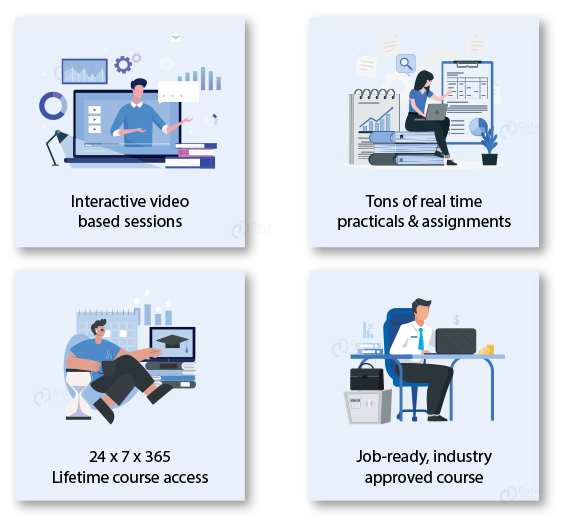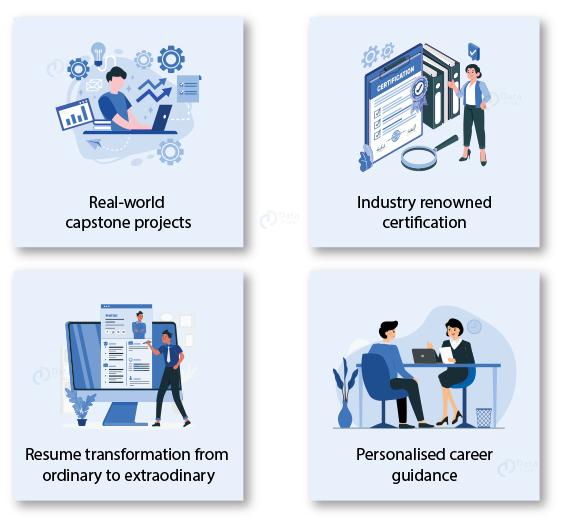Free MEAN Full Stack Web Developer Certification Course
 We’re glad you’re here. This course, whole Stack Development with MEAN (MongoDB, Express, Angular, Node.js), is your first step towards mastering the whole stack of web development tools. This extensive course aims to give you the abilities and information required to create dynamic, end-to-end web applications. This course is designed to meet your needs whether you are a novice looking to break into the web development field or an experienced developer looking to expand your knowledge.
We’re glad you’re here. This course, whole Stack Development with MEAN (MongoDB, Express, Angular, Node.js), is your first step towards mastering the whole stack of web development tools. This extensive course aims to give you the abilities and information required to create dynamic, end-to-end web applications. This course is designed to meet your needs whether you are a novice looking to break into the web development field or an experienced developer looking to expand your knowledge.
What will you take home from this Free MEAN Course?
- Self-paced video course
- 170+ hrs of study material, practicals, quizzes
- Acquire practical knowledge which industry needs
- Practical MEAN course with real-time case-studies
- Lifetime access with industry renowned certification
Why should you enroll in this Free MEAN course?
- Proficiency in MEAN stack-based web application development
- Comprehensive knowledge of the Express.js, Angular, Node.js, and MongoDB frameworks
- Abilities to design engaging front-end experiences and responsive user interfaces
- Proficiency in integrating RESTful APIs and server-side development
- Practical experience working on full-stack projects to highlight your skills
- Experts in the field and seasoned full-stack developers can teach you
- Real-world projects and assignments will help you gain useful knowledge
- To encourage learning, interactive workshops and live coding tasks are used
- Tests and evaluations to determine your understanding
- You can jumpstart your full-stack developer journey with customised career advice
- Keep up with current best practises and trends in web development
- Access to a lively learning community and networking possibilities
MEAN Course Objectives
We have created our Full Stack Development with MEAN course to give you a thorough education in the field of web development utilising the MEAN stack. A strong set of technologies known as the MEAN stack—MongoDB, Express.js, Angular, and Node.js—allows programmers to create dependable and scalable online apps. Beginners who are eager to learn web programming as well as seasoned programmers who want to broaden their skill set and stay current with emerging technologies will both benefit greatly from taking this course.
You will be advised by business professionals with in-depth knowledge of full-stack web development throughout the course. They will guide you through a well-organized curriculum that includes all of the key ideas and techniques. By working on real-world projects, our hands-on approach ensures that you obtain practical experience that will enable you to apply your knowledge to real-life settings and develop a solid portfolio.
The course’s curriculum is set up to accommodate students of all skill levels; you will begin by learning the basics of web programming before moving on to more complicated subjects. You will discover how to utilise Angular to create interactive front-end user interfaces, Node.js and Express.js to implement server-side functionality, and MongoDB to control databases. By the end of this Full Stack Web Development with MEAN course, you’ll be equipped with the knowledge and assurance to create complete web apps on your own, making you a valuable asset in the always developing web development industry. Work on intriguing web projects regardless of your aspirations to become a full-stack developer.
- Comprehensive grasp of the MEAN Stack: The primary goal of this course is to provide you a thorough grasp of the MEAN stack, which is made up of MongoDB, Express.js, Angular, and Node.js. You will learn in-depth information about each MEAN stack component, including their unique functions, how they work together, and how to take use of their combined strength to create feature-rich web apps.
- Real-World Project Work: As part of our course’s emphasis on experiential learning, you will work on actual projects to put your newly learned abilities into practise. From front-end user interfaces to back-end server functionality, these projects have been carefully created to cover a range of web development topics.
- Full Stack Web Development expertise: After completing the course, you will have acquired full stack web development expertise. Both front-end and back-end development duties, such as creating interactive user interfaces, putting server-side logic into place, managing databases, and handling data flow between various application layers, will be within your purview. You will become a highly sought-after professional in the web development sector thanks to this diverse skill set.
- Understanding of Modern Web Development Tools: In addition to learning about the MEAN stack, you will also be given a brief introduction to a number of contemporary web development tools and best practises. This includes package managers, version control systems like Git, and other crucial tools that speed up the development process and improve teamwork.
- Real-world Project Preparation: In addition to helping you improve technical abilities, our course strives to get you ready for actual web development tasks. We’ll talk about project management techniques, successful teamwork techniques, and effective client and team communication. This all-encompassing strategy guarantees that you are not only knowledgeable about development but also prepared to deal with difficulties that arise in actual projects.
Why should you learn Full Stack Web Development with MEAN?
- Full-stack development is one of the most in-demand career choices in the tech sector due to the increasing demand for them. -Workforce Report on LinkedIn.
- “In today’s tech-driven world, full-stack developers are indispensable professionals who can handle both front-end and back-end development.” –Glassdoor.
- Because of its adaptability, scalability, and simplicity, the MEAN stack is becoming more and more popular, luring both developers and enterprises. -Survey of Stack Overflow Developers.
- High Demand in the Job Market: One of the most in-demand skills in the job market is full stack development using MEAN. MEAN stack developers are highly recognised for their versatility and capacity to handle all facets of web development, and businesses across numerous industries are actively looking for developers who can work on the complete stack, from the front-end to the back-end.
- End-to-End Web Development: By learning the MEAN stack, you get the skills to manage every step of the web development process, from Angular’s user interface design to Node.js and Express.js’s server-side logic construction to MongoDB’s data management. You may work on projects individually and produce fully working web applications with this wide-ranging skill set.
- Maintain Current with the Latest Trends: Web development technologies are always changing, and mastering the MEAN stack ensures that you maintain current with the most recent trends and recommended practises in the sector. You will have a competitive advantage in the market as a MEAN stack developer and be prepared to use new technologies and tools as they are developed.
What is MEAN (MongoDB, Express, Angular, Node.js)?
Building online applications utilising a combination of technologies, including MongoDB, Express.js, Angular (formerly AngularJS), and Node.js, is known as “Full Stack Development with MEAN.” Together, the MEAN stack’s many components and their individual roles within the development process provide a complete approach to building dynamic, feature-rich online applications.
- MongoDB: MongoDB is a NoSQL database that uses a JSON-like structure to store data. It is a great option for managing massive amounts of data because of its scalability and versatility. As a document-oriented database, MongoDB makes it easier to integrate with the rest of the MEAN stack by enabling developers to store and retrieve data in a format that closely resembles JavaScript objects.
- Express.js: Express.js is a quick and compact Node.js web application framework. It offers a variety of strong features and resources for creating server-side programmes and APIs. Developers can efficiently manage routes and middleware with Express.js, build scalable and flexible apps, handle HTTP requests and answers, and more.
- An effective front-end JavaScript framework for creating dynamic and interactive user interfaces is Angular (formerly AngularJS). It makes it simple for developers to make single-page applications (SPAs), providing fluid and seamless user interfaces. Because of Angular’s data binding and dependency injection features, it is easier for developers to concentrate on creating user-friendly interfaces.
- The server-side JavaScript runtime Node.js enables programmers to run JavaScript code outside of a web browser. Developers may create scalable and fast server-side apps with Node.js. It is the perfect option for real-time applications and web servers due to its event-driven, non-blocking I/O style, which enables effective handling of concurrent connections.
What to do before you begin?
It’s advantageous to have a foundational understanding of HTML, CSS, and JavaScript before going into the MEAN stack. Understanding the fundamentals of web development will make learning easier. Don’t worry, though, if you’re new to web development. In order to get you started and lay a solid basis, our course offers foundational courses.Who should go for this free Full Stack Web Development with MEAN course?
A wide range of people, including aspiring developers, seasoned programmers, and IT professionals wishing to advance their web development skills, will benefit from the Full Stack Development with MEAN training. People who are interested in mastering both front-end and back-end development utilising the MEAN stack should definitely take the course. The following prominent professional groups can gain from this training:
- Aspiring Web Developers: This class is a great place to start if you’re new to web development and want to jump-start your career. You can learn both front-end (Angular) and back-end (Node.js and Express.js) development with the MEAN stack, giving you the ability to become a well-rounded web developer.
- Experienced programmers: Full Stack programming with MEAN will give you the tools and methods to create complex online apps if you have experience in web programming but want to improve your skill set. You can broaden your knowledge and create new career prospects in the business by becoming an expert in the MEAN stack.
- IT professionals and entrepreneurs: Learning the MEAN stack can greatly increase productivity for IT professionals working on projects that call for the quick creation and deployment of web applications. This programme will enable entrepreneurs with web application concepts to rapidly and effectively develop a minimal viable product (MVP).
- Freelancers and web designers can use this training to expand their skill sets and take on more challenging assignments if they want to go from freelancing to full-stack development. In the market for web development, having a solid understanding of both front-end and back-end technologies will be extremely beneficial.
- Students and Recent Graduates: By knowing the MEAN stack, computer science students and recent graduates can obtain a competitive edge on the employment market. With the help of this course, you will be better able to get work as a full-stack developer by acquiring the practical skills that businesses want.
By enrolling in our MEAN course, you can expect the following benefits:
There are several advantages to taking the Full Stack Development with MEAN course, all of which will help you succeed in the dynamic field of web development. Whether you are a novice or seasoned developer, this thorough training offers beneficial benefits to improve your abilities and job prospects:
- Master the MEAN Stack: The MEAN stack, which consists of MongoDB, Express.js, Angular, and Node.js, is covered in detail in this course. Your ability to build reliable, scalable, and feature-rich web apps from start after learning this potent combination of technologies will allow you to quickly develop end-to-end solutions.
- Real-world Projects: The programme places a strong emphasis on a hands-on methodology with practical projects and assignments. Working on real-world problems allows you to obtain practical web application development expertise, which is necessary to become a skilled full-stack developer.
- Professional Advice: Throughout the course, you will receive professional advice from business people with in-depth knowledge of web development. They offer insightful advice, best practises, and strategies that can help you overcome obstacles and succeed in your educational endeavours.
- Build a Powerful Portfolio: As you finish different projects throughout the programme, you build a strong portfolio that shows off your abilities and knowledge to potential employers. When looking for employment prospects in the crowded web development job market, a strong portfolio is a key advantage.
- Career Advancement: Due to their adaptability and capacity for managing various facets of web development, full stack engineers are in great demand in the tech sector. Your employability and job prospects will dramatically improve after completing this course, giving you the chance to work as a full-stack developer, web application developer, or software engineer.
- Practical Application: The MEAN stack is frequently used to create apps for the real world, particularly for startups and companies who need their applications to be deployed quickly. You will be better equipped to contribute to such projects and advance the development process with the knowledge you receive from this course.
- Utilise the MEAN stack to create personalised online applications
- Create user-friendly and responsive interfaces
- Use the MEAN stack’s foundational technologies, such as MongoDB, Express.js, Angular, and Node.js
- Connect to numerous data sources and integrate APIs
- Utilise Firebase features to improve the functionality of your project
Jobs after Learning this Full Stack Development with MEAN Course
One who successfully completes the Full Stack Development with MEAN course gains access to a wide range of interesting work opportunities in the dynamic industry of web development. Because of your proficiency in creating solid online apps, you become a valuable asset to a variety of businesses and startups as a skilled MEAN stack developer. You can pursue a number of well-known career paths, such as:
- Full Stack Developer: You have in-depth knowledge of both front-end and back-end technologies if you identify as a full stack developer. You are skilled in building user interfaces, managing databases, and implementing server-side logic, all while developing and maintaining the full web application. Your adaptability enables you to take on a variety of tasks and make a contribution to the whole development process.
- MEAN Stack Developer: By specialising in the MEAN stack, you can work effectively with MongoDB, Express.js, Angular, and Node.js, making you a sought-after professional. You are an excellent choice for businesses looking for all-in-one web development solutions since you excel at building feature-rich web apps that take advantage of these technologies.
- Angular Developer: With knowledge of the MEAN stack, you can become an Angular developer with the capacity to create reliable client-side applications. Angular is a popular front-end framework. You are adept at handling data binding, integrating numerous Angular components, and putting responsive user interfaces into practise.
- Node.js Developer: As a MEAN stack developer, you have a strong command of Node.js, a potent server-side runtime environment. You are important to businesses looking for Node.js experience because you can manage server-side logic effectively, handle asynchronous processes with ease, and create scalable and real-time apps.
- Web application developer: You are a master at developing web applications thanks to your thorough understanding of the MEAN stack. You can design interactive web applications that are specifically suited to the requirements of customers and enterprises. You are a significant asset to any development team due to your capability to manage the full development process, from inception through deployment.
Our students are working in leading organizations

Online Full Stack Development with MEAN Free Training Course Curriculum
- Learning the fundamentals of web development
- Learning about front-end and back-end technologies
- A description of the MEAN stack and its role in contemporary web development
- Understanding HTML’s semantic elements, tags, and characteristics
- CSS page styling, including responsive design and layouts
- Gaining knowledge of data types, control structures, and ideas in JavaScript
- Installing Node.js on a local computer
- Recognising the event-driven design of Node.js
- Managing and installing packages with NPM
- Making a simple Node.js server and managing HTTP requests and responses
- Express.js RESTful API implementation
- Recognising the benefits of MongoDB and NoSQL databases
- Establishing a connection to MongoDB
- Performing CRUD operations on collections in MongoDB
- Angular’s features and an overview
- Making Angular modules, components, and services
- Using Angular templates, data binding and user interactions
- Real-time web application introduction
- Using Socket.IO to implement WebSocket communication
- Using Socket.IO Authentication and Authorization to create real-time chat applications
- JWT (JSON Web Tokens) knowledge for safe user authorization
- A MEAN stack application’s user sessions and role management
- SPAs with Angular Routing are Single Page Applications
- Using Angular nested routes to build multi-page applications Using route guards to safeguard routes and regulate access
- Overview of the Mongoose and its characteristics
- Using Mongoose to define MongoDB schemas and models
- Utilising Mongoose Deployment and Project Management to execute sophisticated queries and aggregations
- Launching MEAN stack applications on cloud infrastructure (such as Heroku and AWS)
- Using project management tools (like GitHub, Trello, and Git) and version control to manage and collaborate on MEAN stack projects
- Creating unit tests and integration tests with Mocha and Chai frameworks
- Analysing and resolving typical problems in MEAN stack applications
- Putting in place tools for error handling and logging
- Adopting best practises for MEAN stack development Improving the speed and efficiency of MEAN apps
- Putting security measures in place to guard against widespread vulnerabilities
- Working on complete real-world MEAN stack projects
- Acquiring practical experience through tasks and challenges
- Creating a collection of MEAN stack applications to demonstrate your abilities
Features of MEAN Free Course


